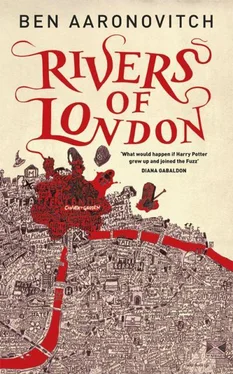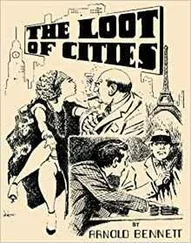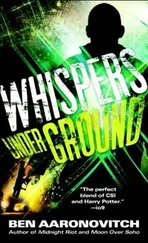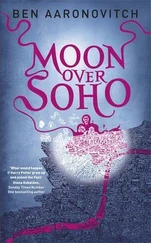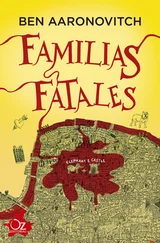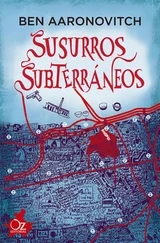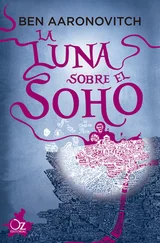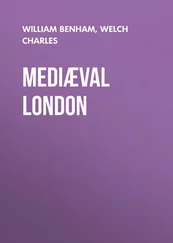‘And you’re asking—’
‘I am not asking ,’ I said, pleasantries over. ‘You want to fuck with me, Tyburn, you had better know who you’re messing with.’
Tyburn took a step back and recovered. ‘We know who you are,’ she said. ‘Your father is a failed musician and your mother cleans offices for a living. You grew up in a council flat, and you went to your local comprehensive and you failed your A levels …’
‘I am a sworn constable,’ I said, ‘and that makes me an officer of the law. I am also an apprentice, which makes me a keeper of the sacred flame, but most of all I am a free man of London and that makes me a Prince of the City.’ I jabbed a finger at Tyburn. ‘No double first from Oxford trumps that.’
‘You think so?’ she said.
‘Enough,’ said Mama Thames. ‘Let him into his house.’
‘It’s not his house,’ said Tyburn.
‘Do as I say,’ said Mama Thames.
‘But Mum …’
‘Tyburn!’
Tyburn looked stricken, and for a moment I felt genuinely sorry for her because none of us is ever grown-up enough that our mothers don’t think they can’t beat us. She slipped a slimline Nokia from her pocket and dialled a number without taking her eyes off mine. ‘Sylvia,’ she said. ‘Is the Commissioner available? Good. Could I have a quick word?’ Then, having made her point to her own satisfaction, she turned and walked from the room. I resisted the urge to gloat but I did glance over at Beverley to see if she was impressed with me. She gave me a studiously indifferent look that was as good as a blown kiss.
‘Peter,’ said Mama Thames, and beckoned me over to her chair. She indicated that she wanted to tell me something private. I tried to bend down with as much dignity as I could but I found myself, much to Brent’s amusement, on my knees before her. She leaned forward and brushed her lips against my forehead.
For a moment it was as if I stood high up on the middle cowling of the Thames Barrier looking east over the mouth of the river. I could feel the towers of Canary Wharf rising triumphantly at my back and beyond them the docks, the White Tower and all the bridges, bells and houses of London town. But ahead of me over the horizon I could feel the storm surge, the fatal combination of high tides, global warming and poor planning, waiting. Ready to drive a wall of water ten metres high up the river and bring down the bridges, towers and Uncle Tom Cobley and all.
‘Just so you understand,’ said Mama Thames, ‘where the real power lies.’
‘Yes, Mama,’ I said.
‘I expect you to sort out my dispute with the Old Man,’ she said.
‘I’ll do my best,’ I said.
‘Good boy,’ she said. ‘And because of your good manners, I have a last gift.’ She bent her head and whispered a name in my ear: ‘Tiberius Claudius Verica.’
The paratroopers were gone by the time I got back to Russell Square. I was back in charge of the Folly, and also responsible. Toby slammed into my ankles as soon as I was across the threshold, panting and thrashing affectionately, although once he’d established that I wasn’t carrying anything edible he lost interest and scampered off. Molly was waiting for me at the foot of the western stairs. I told her that Nightingale was conscious and then lied and said that he’d asked how she was. I told her what I was planning to do and she physically recoiled.
‘I’m just going to my room to get some stuff,’ I said. ‘I’ll be back down in half an hour.’
As soon as I reached my room I pulled out my Latin notes and checked the stuff about Roman names. Which, I’d learned, often have three bits — praenomen, nomen and cognomen — and, if you can read your own handwriting, tell you a lot about the individual. Verica wasn’t a Latin name; I suspected it was British, and Tiberius Claudius were the first two names of Tiberius Claudius Caesar Augustus Germanicus, otherwise known as Emperor Claudius, him who was in charge when Britain was first conquered by the Romans. The Empire liked to co-opt the local ruling elite wherever possible — it being easier to get your leg over a country if you forked out for dinner and a dozen roses first. One of the bribes on offer was Roman citizenship, and many who took up that offer kept their native name and prefixed the praenomen and nomen of their sponsors — in this case the Emperor. Thus, just from the evidence of his name, Tiberius Claudius Verica was an aristocratic Briton who lived around the time the city was founded.
Which meant nothing, as far as I could tell. If I survived the next hour or so, I planned to have a word with Mama Thames about it. But I had more immediate problems.
In 1861 William Booth resigned from the Methodists in Liverpool and headed for London where, in the grand tradition of metropolitan reinvention, he founded his own church and took Christ, bread and social work to the heathen natives of east London. In 1878 he declared that he was tired of being called a volunteer and that he was a regular in the army of Christ or nothing at all; thus the Salvation Army was born. But no army, however pure its motives, occupies a foreign country without resistance, and this was provided by the Skeleton Army. Driven by gin, bone-headedness and growling resentment that being the Victorian working class was bad enough without being preached at by a bunch of self-righteous northerners, the Skeleton Army broke up Salvation Army meetings, disrupted marches and attacked its officer corps. The emblem of the Skeleton Army was a white skeleton against a black background — a badge worn by right-thinking ne’er-do-wells from Worthing to Bethnal Green. I’d spotted one on the ghostly form of Nicholas Wallpenny, a candidate for the Skeleton Army if ever there was one, and it was this badge that I’d recovered from the graveyard of the Actor’s Church. Nightingale had said that I was going to need a spirit guide, and in the absence of mystical bears, coyotes or whatever, a larcenous cockney was going to have to do.
The badge was where I’d left it, in the plastic box where I kept my paperclips. I picked it up and held it in the palm of my hand. It was just a cheap little thing, pewter and brass. When I closed my hand around it there was the fleeting taste of gin, old songs and just a little stab of resentment.
If this was to be a spiritual journey I wasn’t going to need anything else, and I’d put off the moment long enough. I went reluctantly downstairs to where Molly was waiting for me in the middle of the atrium. She stood with her head bowed, her hair a black curtain hiding her face, hands locked in front of her.
‘I don’t want to do this either,’ I said.
She raised her head, and for the first time looked me directly in the eye. ‘Do it,’ I said.
She moved so fast I didn’t see it, throwing herself against me. One arm snaked around my shoulders and grabbed the back of my head, the other went around my waist. I could feel her breasts pressing against my chest, her thighs clamping hard around my leg. Her face was buried in the hollow of my neck, and I felt her lips against my throat. Fear rolled over me: I tried to pull myself free but she held me tighter than a lover. I felt her teeth scrape at my neck and then pain, strangely more like a blow rather than a stab, as she bit me hard. I felt the action of her swallowing as she sucked at my blood but I also felt the connection with the tiles beneath me and the bricks in the walls — the yellow London clay — and then I was falling backwards into daylight and the smell of turpentine.
It wasn’t like a VR or a how you imagine a hologram should work; it was like breathing vestigia , like swimming in stone. I found myself in the Folly’s own memory of the atrium.
I’d done it — I was in.
Читать дальше
